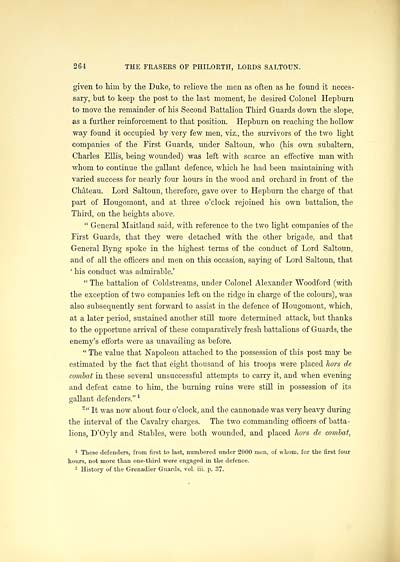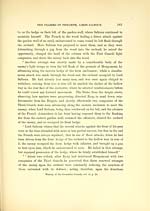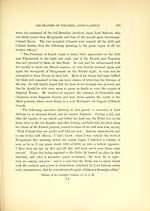Frasers of Philorth > Volume 1
(336)
Download files
Complete book:
Individual page:
Thumbnail gallery: Grid view | List view

264 THE FRASERS OF PHILORTH, LORDS SALTOUN.
given to hini by the Duke, to relieve the men as often as he found it neces-
sary, but to keep the post to the last moment, he desired Colonel Hepburn
to move the remainder of his Second Battalion Third Guards down the slope,
as a further reinforcement to that position. Hepburn on reaching the hollow
way found it occupied by very few men, viz., the survivors of the two light
companies of the First Guards, under Saltoun, who (his own subaltern,
Charles Ellis, being wounded) was left with scarce an effective man with
whom to continue the gallant defence, which he had been maintaining with
varied success for nearly four hours in the wood and orchard in front of the
Chateau. Lord Saltoun, therefore, gave over to Hepburn the charge of that
part of Hougomont, and at three o'clock rejoined his own battalion, the
Third, on the heights above.
" General Maitland said, with reference to the two light companies of the
First Guards, that they were detached with the other brigade, and that
General Byng spoke in the highest terms of the conduct of Lord Saltoun,
and of all the officers and men on this occasion, saying of Lord Saltoun, that
' his conduct was admirable.'
" The battalion of Colclstreams, under Colonel Alexander Woodford (with
the exception of two companies left on the ridge in charge of the colours), was
also subsequently sent forward to assist in the defence of Hougomont, which,
at a later period, sustained another still more determined attack, but thanks
to the opportune arrival of these comparatively fresh battalions of Guards, the
enemy's efforts were as unavailing as before.
" The value that Napoleon attached to the possession of this post may be
estimated by the fact that eight thousand of his troops were placed hors de
combat in these several unsuccessful attempts to carry it, and when evening
and defeat came to him, the burning ruins were still in possession of its
gallant defenders." *
z " It was now about four o'clock, and the cannonade was very heavy during
the interval of the Cavalry charges. The two commanding officers of batta-
lions, D'Oyly and Stables, were both wounded, and placed hors de combat,
1 These defenders, from first to last, numbered under 2000 men, of whom, for the first four
hours, not more than one-third were engaged in the defence.
2 History of the Grenadier Guards, vol. iii. p. 37.
given to hini by the Duke, to relieve the men as often as he found it neces-
sary, but to keep the post to the last moment, he desired Colonel Hepburn
to move the remainder of his Second Battalion Third Guards down the slope,
as a further reinforcement to that position. Hepburn on reaching the hollow
way found it occupied by very few men, viz., the survivors of the two light
companies of the First Guards, under Saltoun, who (his own subaltern,
Charles Ellis, being wounded) was left with scarce an effective man with
whom to continue the gallant defence, which he had been maintaining with
varied success for nearly four hours in the wood and orchard in front of the
Chateau. Lord Saltoun, therefore, gave over to Hepburn the charge of that
part of Hougomont, and at three o'clock rejoined his own battalion, the
Third, on the heights above.
" General Maitland said, with reference to the two light companies of the
First Guards, that they were detached with the other brigade, and that
General Byng spoke in the highest terms of the conduct of Lord Saltoun,
and of all the officers and men on this occasion, saying of Lord Saltoun, that
' his conduct was admirable.'
" The battalion of Colclstreams, under Colonel Alexander Woodford (with
the exception of two companies left on the ridge in charge of the colours), was
also subsequently sent forward to assist in the defence of Hougomont, which,
at a later period, sustained another still more determined attack, but thanks
to the opportune arrival of these comparatively fresh battalions of Guards, the
enemy's efforts were as unavailing as before.
" The value that Napoleon attached to the possession of this post may be
estimated by the fact that eight thousand of his troops were placed hors de
combat in these several unsuccessful attempts to carry it, and when evening
and defeat came to him, the burning ruins were still in possession of its
gallant defenders." *
z " It was now about four o'clock, and the cannonade was very heavy during
the interval of the Cavalry charges. The two commanding officers of batta-
lions, D'Oyly and Stables, were both wounded, and placed hors de combat,
1 These defenders, from first to last, numbered under 2000 men, of whom, for the first four
hours, not more than one-third were engaged in the defence.
2 History of the Grenadier Guards, vol. iii. p. 37.
Set display mode to:
![]() Universal Viewer |
Universal Viewer | ![]() Mirador |
Large image | Transcription
Mirador |
Large image | Transcription
Images and transcriptions on this page, including medium image downloads, may be used under the Creative Commons Attribution 4.0 International Licence unless otherwise stated. ![]()
| Histories of Scottish families > Frasers of Philorth > Volume 1 > (336) |
|---|
| Permanent URL | https://digital.nls.uk/96569532 |
|---|
| Attribution and copyright: |
|
|---|
| Description | A selection of almost 400 printed items relating to the history of Scottish families, mostly dating from the 19th and early 20th centuries. Includes memoirs, genealogies and clan histories, with a few produced by emigrant families. The earliest family history goes back to AD 916. |
|---|

